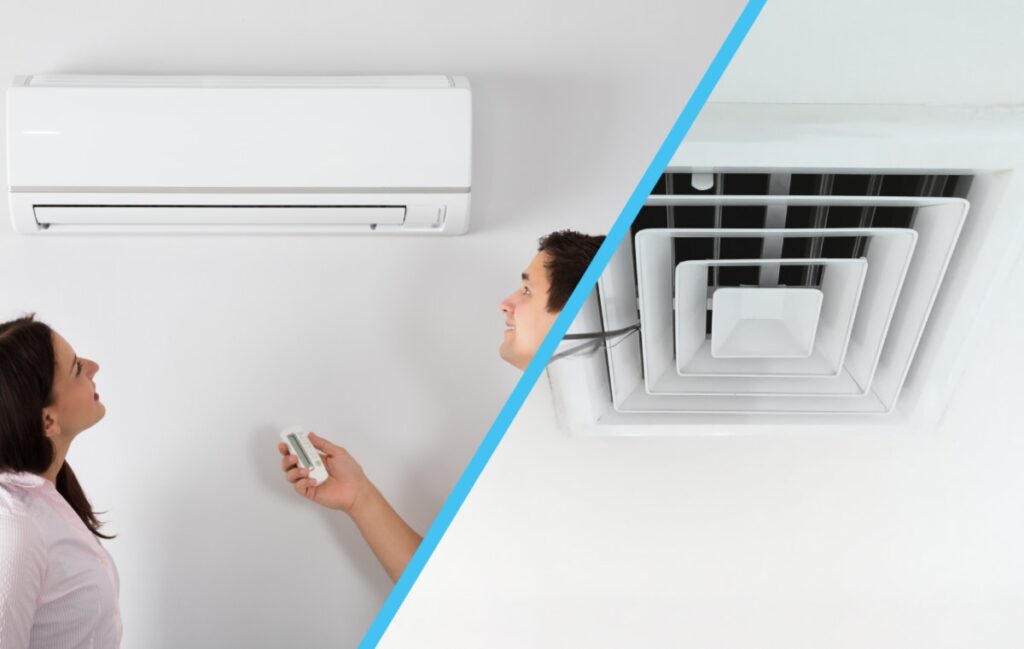Choosing the right air conditioning system for your Perth home can feel overwhelming, especially with so many options available. Two of the most popular choices are split system air conditioners and ducted air conditioning. Both offer unique advantages, and the best option for your home depends on various factors including your budget, home size, energy efficiency goals, and comfort needs.
In this blog, we’ll break down the key differences, pros and cons, and considerations for each type of air conditioning system to help you make an informed decision tailored to your Perth lifestyle.
Understanding Split System Air Conditioning
A split system consists of two main components: an indoor unit and an outdoor compressor. These units are connected by refrigerant piping and electrical wiring. Split systems are commonly used to cool or heat individual rooms or open-plan living areas.
Pros:
- Cost-Effective Installation: Split systems are more affordable to install compared to ducted systems, especially if you’re only targeting one or two rooms.
- Zoning Flexibility: Ideal for homeowners who only need climate control in specific rooms.
- Energy Efficiency: Because you’re only heating or cooling one area at a time, split systems can be highly energy-efficient.
- Quick Installation: The installation process is straightforward and usually completed within a day.
Cons:
- Limited Coverage: Not suitable for large homes or where whole-house coverage is needed.
- Aesthetic Impact: The indoor unit is visible and may not suit every home decor style.
Understanding Ducted Air Conditioning
Ducted air conditioning is a centralized system where a single unit distributes conditioned air through ducts installed in the ceiling or under the floor, delivering air to multiple rooms simultaneously.
Pros:
- Whole-Home Solution: Perfect for consistent temperature control across the entire house.
- Discreet Appearance: Vents are the only visible components, preserving interior aesthetics.
- Zoning Options: Modern ducted systems offer zoning, enabling you to control different areas separately.
- Property Value Boost: Often seen as a premium feature, ducted systems can increase the resale value of your home.
Cons:
- Higher Initial Cost: Installation is more complex and expensive.
- Energy Consumption: If zoning is not used effectively, energy bills can be higher compared to split systems.
- Installation Disruption: Requires space in the ceiling or under the floor, and the installation may take a few days.
Factors to Consider for Perth Homes
1. Climate
Perth is known for its unpredictable weather, often experiencing four seasons in a day. Both split and ducted systems can include reverse cycle functionality (cooling and heating), making them suitable for year-round use. However, ducted systems may offer better performance for larger homes during extreme weather fluctuations.
2. Home Size and Layout
- Small to Medium Homes: A split system may be more than sufficient, especially for targeted cooling.
- Large Homes or Multi-Level Residences: A ducted system is often more practical and efficient in the long run.
3. Budget
- Installation Costs: Split systems cost less to install and maintain.
- Operating Costs: While ducted systems may cost more to run, zoning features can mitigate this by allowing you to heat or cool only occupied rooms.
4. Aesthetics and Space
- Split Systems: May clash with interior decor due to the visible wall-mounted unit.
- Ducted Systems: More discreet and blends seamlessly into the ceiling or floor.
5. Usage Habits
- Occasional Use: If you only need cooling or heating occasionally or in specific areas, a split system is likely sufficient.
- Daily Whole-Home Use: Ducted systems offer comprehensive climate control and are ideal for families or those who work from home.
Cost Comparison: Split vs. Ducted
Feature | Split System | Ducted System |
Installation Cost | Lower | Higher |
Maintenance | Minimal | Moderate |
Energy Efficiency | High for single room | High if zoning is used |
Aesthetics | Visible indoor unit | Discreet vents only |
Control | Room-by-room | Whole home or zoned |
Best for | Apartments, small homes | Large homes, families |
Final Verdict
So, which system is best for your Perth home?
- Choose a Split System if you:
- Live in a smaller home or apartment.
- Only need cooling in specific areas.
- Have a limited budget for upfront installation.
- Want faster, less disruptive installation.
- Choose a Ducted System if you:
- Want to cool or heat the entire house.
- Value a sleek, minimalist look.
- Can afford a higher initial investment for long-term comfort.
- Plan to increase your home’s resale value.
Additional Considerations
1. Smart Controls and Integration
Modern air conditioning systems, both split and ducted, now come with smart features. Integration with smart home assistants like Google Home or Alexa lets you control temperature, zoning, and scheduling via voice or smartphone app.
2. Energy Star Ratings
When choosing either system, check the energy star rating. Higher-rated units consume less electricity, helping reduce your carbon footprint and energy bills.
3. Government Rebates and Incentives
In Perth, government rebates may be available for energy-efficient installations. This can significantly reduce the upfront cost, particularly for ducted systems with high-efficiency ratings.
4. Noise Levels
Split systems are generally quieter, especially when only cooling a single area. Ducted systems can be slightly noisier depending on the ducting design and airspeed, but newer systems are becoming increasingly quiet.
Conclusion
Ultimately, both split and ducted air conditioning systems offer great benefits. The choice comes down to your specific needs, budget, and the layout of your Perth home. Consulting with an HVAC expert can help you assess your space and choose the system that delivers the best comfort, efficiency, and value.
At Aircool Care, we specialise in the installation, servicing, and maintenance of both split system and ducted air conditioning units across Perth. Contact us today for a personalised consultation and let us help you create a comfortable indoor climate year-round.

